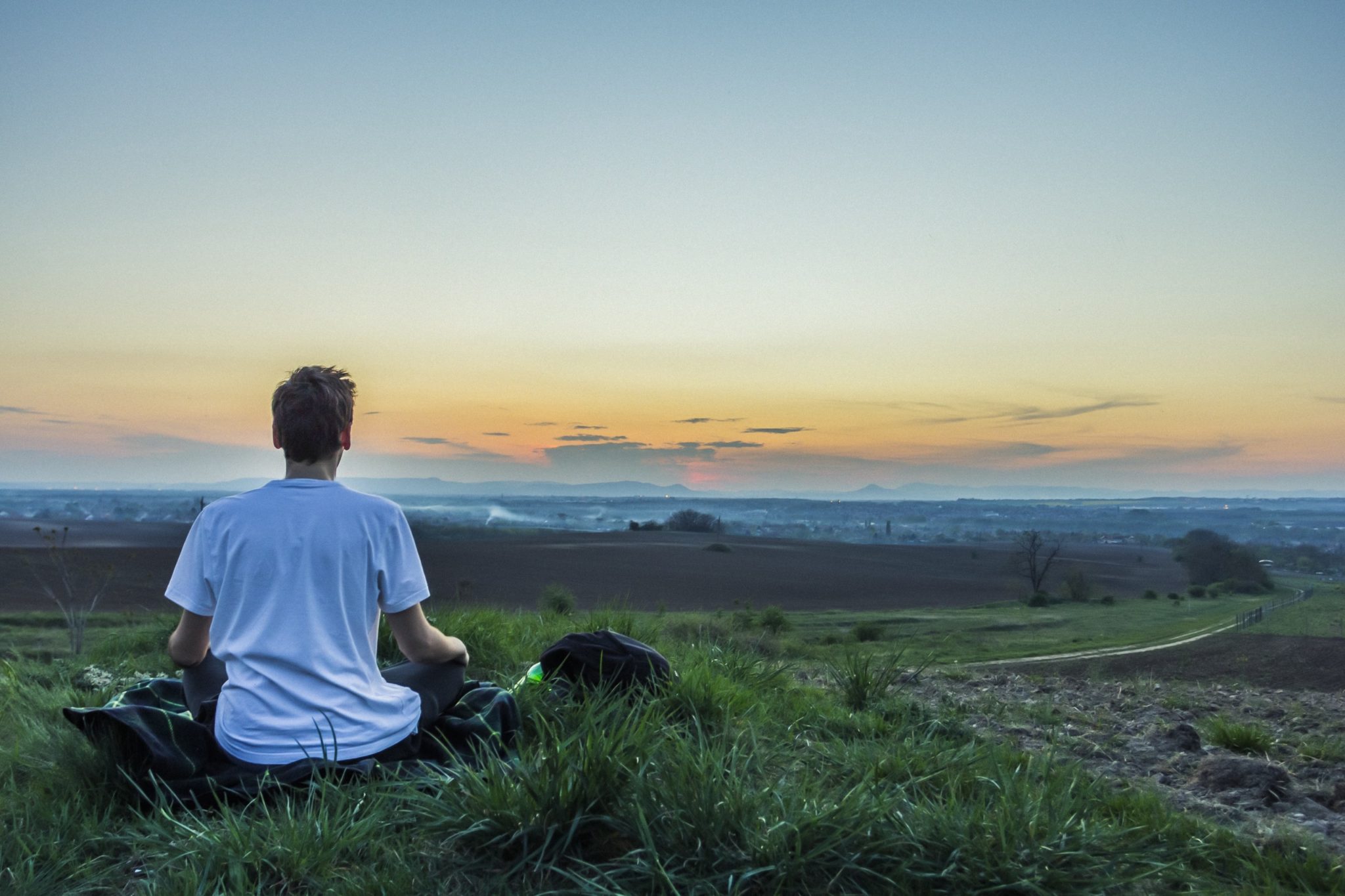
How mindfulness meditation make your life better
Peter Chan 2018-01-08
Meditation — How I made life better in one year
How to be happier, and make wiser decisions every day
Who this is for:
Anyone. Meditation is too nice to have some people excluded.
TL;DR 1. Meditation made me (very much) happier and almost better in every aspect. 2. Meditation is not very hard, but it is not easy. 3. Perseverance is the key to build up the habit of mindfulness.
In 2017, I meditate every day and picking up meditation as a habit is simply one of the best life decisions I’ve ever made.
I feel happier, more composed, and able to do everything with more lucidity.
Here’s how:
The starting point
Meditation has been revolving around me for serval years, although it had never been an important part of me. I might do it on a fine sunny day when I feel like it, but not the other days when more important things were on my schedule.
I was using HeadSpace.com. This platform contains meditation soundtracks intertwined with mindfulness practices such as thought diary. The exercdises are easy to follow, and the platform has a delightful interface.
I used their service for about a year. I did notice some rather subtle changes if they’re not unnoticeable at all.
Don’t get me wrong. Headspace is an awesome platform. I just lacked the impetus to do it every day.
Mediation is much like going to the gym or eating healthily, doesn’t work until it becomes a habit. That was why I didn’t have much chemistry with HeadSpace.
I knew meditation is a nice thing to do, but I felt I didn’t need it. At times, what we need is not the best book or the best piece of advice, but some words that touch our soul in the present moment. What didn’t work before might work in the present; what will work in the future might not work in the present.
For me, meditation didn’t change much, but then it did.
Stick to it for real changes.
The turning point
2016 was rather a hectic year for me. I left the UK to continue my studies in Hong Kong. Moving to another country, even my own was stressful. A lot of things needed to be reoriented.
Things didn’t go well as I recalled — I wouldn’t say I was on the verge of collapsing, but I least I would say 2016 was very far from enjoyable for me.
Then, a friend recommended me the Mindfulness: A practical guide to finding peace in a frantic World book.
This was not my first mindfulness book, but it came at the right time. My dissatisfaction with life, frequent chatters that blamed myself for my emotional reactions to different events were gently addressed and soothed by the words of the book. Such resonance made determine my decision to follow through, without excuses, the meditation programme in the book.
Frantic World is an excellent book of its kind. It consists of an 8-week programme requiring a daily investment of 20 minutes. In addition to the formal meditation practice (aka sitting there), the book features guided mindful activities ranging from eating raisin to visiting a museum. Explanations accompanying the exercises are always clear and backed with evidence.
The effect became noticeable after following the programme tightly for about two weeks. I first noticed the enhanced lucidity of mind. I started to appreciate trivial things in life that never grabbed my attention before. One day I pulled out a piece of tissue and was amazed by the soft texture that rubbed my hand — I knew it was the charm of mindfulness.
Why on earth I was feeling happy for a piece of tissue? There are, of course, moments in our life that are way better than holding a flimsy piece of tissue.
But the past is gone; The future is yet to come.
All we have is the present. Sometimes, all we have is the gentle touch of a piece of tissue. Isn’t it nice to get more out of it?
Live in the only moment we have.
Better, better, and better
The goal of meditation is to fuse mindfulness practice into daily life.
I feel relaxed in meditation sessions, but the impact of meditating is far beyond feeling relaxed while meditating. Instead, we treat meditations as little experiments. We spend time observing our mind, notice how are we easily distracted, how a single piece of negative thought can grow into a depressive thinking stream. We gain insights on these and apply the observations in our daily life, for instance, when a negative thought pops in, I know how to notice it without fuelling it with more negative thoughts, the result is greater control over daily thinking and emotional pattern.
Therefore, the daily meditation session is crucial. It’s a reminder of not to forget mindful living. Think of Cobb’s spinning top in the movie Inception: it’s useful only if Cobb checks it frequently.
Mindfulness is no difference: we need to nurture a habit to be constantly aware of the state of our mind.
The habit is hard to nurture. Meditation itself is a painstaking activity. Boredom, agitation, reluctance or tiredness might strike anytime. These feelings may even stop us from meditating.
But the habit, once acquired, is of immense power.
Good things happen in life. Bad things also happen in life. External circumstances govern our reaction without our deliberations. Heard some offensive words? Fightback.
But awareness of mind adds a layer in between the external circumstance and reaction. A mindful practitioner can notice how they’re tempted to react — then deliberately decide how to react. The transition is a bit like from an audience of a movie to the director of the movie. The movie of our life.
Such transition is not an on-and-off button of course. At times I react without thinking much too. There is, however, a pretty clear trend of improvement of how much I am aware of my thoughts in retrospect.
Mindfulness can rewire the brain and change its biological structure, but it takes time. Meditation can untie knots in our mind — but it can’t untie all the knots that have been there for all our life in no time.
Give it time.
To spice it up
Well experienced the benefits of meditation, I joined a 10-day meditation retreat in a Buddhist temple. It was a full-time, hard-core experience. To sum it up I would say it’s good and bad — it deepened my practice, but the camp itself was tough.
As I stepped into the door of my dormitory, I was greeted by an overwhelming amount of ants. These ants were everywhere: on the floor, on my bed, and in my bags. Waking up at 5, we had breakfast at 7 and lunch at 11, and we weren’t allowed to have food in the afternoon.
The daily routine was all about meditation. There was no recreational activity in the 10-day period. Meditation sessions progressively increased from 30 minutes to 60 minutes. I was doing 8–10 sessions per day. It was a very exhausting mental activity. Approaching the end of each session, I noticed my mind was at unrest, and also the body because of the cramped posture. “Did I forget to set the timer?” I said to myself every minute because an hour seemed unreasonably lengthy with my mind focused.
Ten days felt so long, but it eventually came to an end. Stepping out the temple, I found the city seemed more splendid than ever. Sights of the street, a touch of the wind played a lively drama in my mind.
Indulging myself in urban reunion, I lost my wallet in a foreign country right after I left the camp. For a short moment I panicked, but soon the meditation training kicked into my mind. I observed my anxiety and aggrievement, and it was like I put them in a container — they were still there, but unable to affect me. I then aptly reported to the police and gathered some new fund, as this incident was settled. I continued to roam with my vacation mood unaffected.
Two important realisations
I can’t stay focused!
Like many beginners of meditation. I felt the urge to purge my mind. I was perturbed by the tumultuous state of my mind.
Being distracted several times every minute is indeed frustrating, but meditation doesn’t make the mind tumultuous, nor purging the mind is the objective of meditation. Meditation is the practice to realise how the mind is being distracted.
Noticing the mind being distracted itself is meditation.
The constant distraction-pull back cycles will eventually give us greater control over our mind
I don’t see any effect!
There are many things that I can’t be forced, and the benefit of meditation is one of them.
It is, of course, sensible to endorse the “just try a little bit” strategy. I once dipped my toe lightly in meditation and was somewhat disappointed in the outcomes. I believe changes were there, but whether being able to notice them was another thing. I needed much more for an apparent effect.
“The more we put in, the more we get out” is the mantra of meditation.
What later helped me actually to get something out of mediation was faith. Faith in meditation. Faith in all the scientific endeavours that validated the effectiveness of meditation.
I made a decision. No matter what, I am going to complete the mediation programme in the book.
In the first week, things were just as the same. I mumbled to myself constantly: “Oh! Why I am doing this?” “Is it really useful?” “ I can’t feel anything” But I knew no matter what, I was going to meditate for at least 8-weeks.
Ruled out quit as an option, I continued, and gradually things changed as I carried on. The annoyance was replaced, bit by bit, with the fruits of meditation.
Trust me. It will pay off.
The takeaway
What’s the best way to start meditating? The way that will actually make one get started is the best way. Let me make it clear: the investment is 20 minutes per day for at least a month. 20 minutes might sound short, but most meditators find it tougher than expected.
The Frantic World book was an excellent one. But it is not the only option. Headspace.com is easy-going and fun. Even a simple online tutorial will work. The key is to make it a habit and do it every day.
Try it for two months. Unless the sky falls, quitting is not an option. Not liking it? Continue. Feeling tired? Continue. Bored? Continue. Decide whether to continue after two month. The only way to get anything out of meditation is to try it. I am pretty sure the improvements will be quite clear by then.
Convinced? Then go.
Liked this article? Also check out my tips on how to be a better speaker with mindfulness:
By the way, if you turns out to be living in Hong Kong, check out the meditation group that I lead :)
https://treehole.hk
